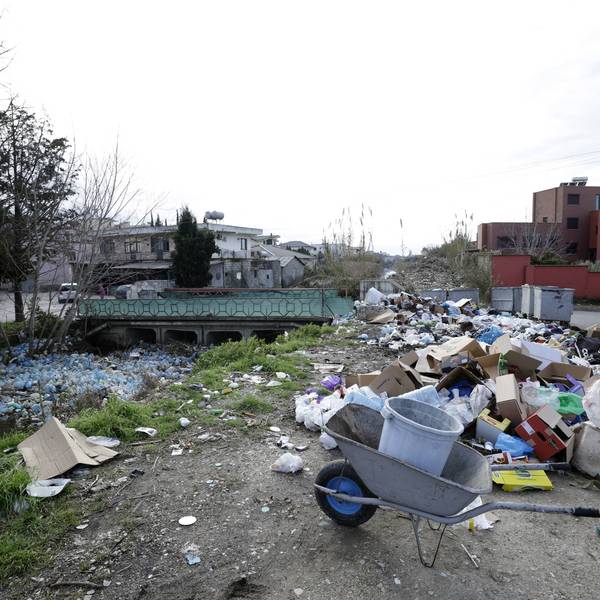
Smoke billows from chemical plants in Baton Rouge, Louisiana, in 2013. “Cancer Alley,” a concentration of petrochemical plants amid residential homes, runs along the Mississippi River from Baton Rouge to New Orleans.
Lancet Study Warns Cancer Deaths Could Surge Nearly 75% by 2050
One researcher called the projections "an impending disaster" for low-income nations.
An ominous new study in the Lancet medical journal projects that deaths from cancer will surge over the next two-and-a-half decades, with lower-income countries set to be the hardest hit.
The study, which was released on Wednesday, estimates that there will be 18.6 million cancer deaths and 30.5 million cancer cases in 2030. The estimated number of cancer deaths would represent a nearly 75% increase from the estimated 10.4 million cancer deaths in 2023.
The study explains that the forecasted death increases "are greater in low-income and middle-income countries" than in wealthy nations, and that most of the projected increases are likely to come from an older population, not a rise in the lethality of cancer overall.
All the same, the study warns that the total increase in cancer cases and deaths will put a strain on global health systems.
"Effectively and sustainably addressing cancer burden globally will require comprehensive national and international efforts that consider health systems and context in the development and implementation of cancer-control strategies across the continuum of prevention, diagnosis, and treatment," the study says.
Meghnath Dhimal, chief research officer at the Nepal Health Research Council, who worked on the study, told Euronews that the projections showed "an impending disaster" for low-income nations. Dhimal also said that these nations needed to do more to improve their citizens' access to cancer screenings and treatments to prevent their systems from potentially being overwhelmed.
"There are cost-effective interventions for cancer in countries at all stages of development," he said.
Dr. Theo Vos, a researcher at the Institute for Health Metrics and Evaluation who helped author the study, told Euronews that the incidence of cancer could be significantly reduced by lowering tobacco use, unsafe sex, obesity, and high blood sugar, among other factors.
"There are tremendous opportunities for countries to target these risk factors, potentially preventing cases of cancer and saving lives," Vos explained.
An Urgent Message From Our Co-Founder
Dear Common Dreams reader, The U.S. is on a fast track to authoritarianism like nothing I've ever seen. Meanwhile, corporate news outlets are utterly capitulating to Trump, twisting their coverage to avoid drawing his ire while lining up to stuff cash in his pockets. That's why I believe that Common Dreams is doing the best and most consequential reporting that we've ever done. Our small but mighty team is a progressive reporting powerhouse, covering the news every day that the corporate media never will. Our mission has always been simple: To inform. To inspire. And to ignite change for the common good. Now here's the key piece that I want all our readers to understand: None of this would be possible without your financial support. That's not just some fundraising cliche. It's the absolute and literal truth. We don't accept corporate advertising and never will. We don't have a paywall because we don't think people should be blocked from critical news based on their ability to pay. Everything we do is funded by the donations of readers like you. Will you donate now to help power the nonprofit, independent reporting of Common Dreams? Thank you for being a vital member of our community. Together, we can keep independent journalism alive when it’s needed most. - Craig Brown, Co-founder |
An ominous new study in the Lancet medical journal projects that deaths from cancer will surge over the next two-and-a-half decades, with lower-income countries set to be the hardest hit.
The study, which was released on Wednesday, estimates that there will be 18.6 million cancer deaths and 30.5 million cancer cases in 2030. The estimated number of cancer deaths would represent a nearly 75% increase from the estimated 10.4 million cancer deaths in 2023.
The study explains that the forecasted death increases "are greater in low-income and middle-income countries" than in wealthy nations, and that most of the projected increases are likely to come from an older population, not a rise in the lethality of cancer overall.
All the same, the study warns that the total increase in cancer cases and deaths will put a strain on global health systems.
"Effectively and sustainably addressing cancer burden globally will require comprehensive national and international efforts that consider health systems and context in the development and implementation of cancer-control strategies across the continuum of prevention, diagnosis, and treatment," the study says.
Meghnath Dhimal, chief research officer at the Nepal Health Research Council, who worked on the study, told Euronews that the projections showed "an impending disaster" for low-income nations. Dhimal also said that these nations needed to do more to improve their citizens' access to cancer screenings and treatments to prevent their systems from potentially being overwhelmed.
"There are cost-effective interventions for cancer in countries at all stages of development," he said.
Dr. Theo Vos, a researcher at the Institute for Health Metrics and Evaluation who helped author the study, told Euronews that the incidence of cancer could be significantly reduced by lowering tobacco use, unsafe sex, obesity, and high blood sugar, among other factors.
"There are tremendous opportunities for countries to target these risk factors, potentially preventing cases of cancer and saving lives," Vos explained.
- New Report Details Harmful Impact of Air Pollution at Every Stage of Life ›
- Taking 9 Million Lives Per Year, Pollution Bigger Killer Than War, Tobacco, and Various Diseases Combined ›
An ominous new study in the Lancet medical journal projects that deaths from cancer will surge over the next two-and-a-half decades, with lower-income countries set to be the hardest hit.
The study, which was released on Wednesday, estimates that there will be 18.6 million cancer deaths and 30.5 million cancer cases in 2030. The estimated number of cancer deaths would represent a nearly 75% increase from the estimated 10.4 million cancer deaths in 2023.
The study explains that the forecasted death increases "are greater in low-income and middle-income countries" than in wealthy nations, and that most of the projected increases are likely to come from an older population, not a rise in the lethality of cancer overall.
All the same, the study warns that the total increase in cancer cases and deaths will put a strain on global health systems.
"Effectively and sustainably addressing cancer burden globally will require comprehensive national and international efforts that consider health systems and context in the development and implementation of cancer-control strategies across the continuum of prevention, diagnosis, and treatment," the study says.
Meghnath Dhimal, chief research officer at the Nepal Health Research Council, who worked on the study, told Euronews that the projections showed "an impending disaster" for low-income nations. Dhimal also said that these nations needed to do more to improve their citizens' access to cancer screenings and treatments to prevent their systems from potentially being overwhelmed.
"There are cost-effective interventions for cancer in countries at all stages of development," he said.
Dr. Theo Vos, a researcher at the Institute for Health Metrics and Evaluation who helped author the study, told Euronews that the incidence of cancer could be significantly reduced by lowering tobacco use, unsafe sex, obesity, and high blood sugar, among other factors.
"There are tremendous opportunities for countries to target these risk factors, potentially preventing cases of cancer and saving lives," Vos explained.
- New Report Details Harmful Impact of Air Pollution at Every Stage of Life ›
- Taking 9 Million Lives Per Year, Pollution Bigger Killer Than War, Tobacco, and Various Diseases Combined ›

